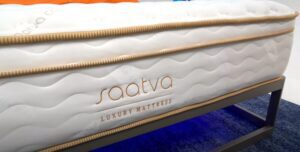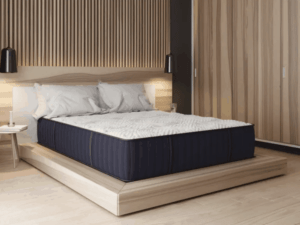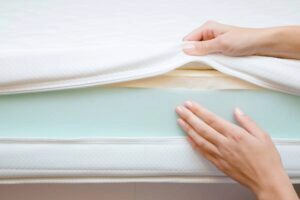Casper Mattress Alternatives
Disclosure: By clicking on the product links in this article, Mattress Nerd may receive a commission fee at no cost to you, the reader. Read full disclosure statement.
Casper mattresses are well-known and well-loved for a multitude of reasons. To start, they’re high quality, affordable, and darn cozy. Casper distinguishes their mattress models from competitors’ by incorporating proprietary (i.e. invented by Casper) foam and splitting the second layer into comfort zones.
With that said, Casper isn’t the only noteworthy mattress company on the bed-in-a-box scene. You’re probably eyeing a handful of options, and there are tons of other brands to consider. To aid your search, we’ve rounded up a list of our top Casper mattress alternatives. With each comparison, we’ll highlight how the mattresses are similar and different and what makes the alternative a worthy choice.
Disclosure: By clicking on the product links in this article, Mattress Nerd may receive a commission fee at no cost to you, the reader. Read full disclosure statement.
Casper Mattress Alternatives
| Casper Mattresses | Best Alternative Option |
| Casper Original | TEMPUR-Cloud |
| Casper Hybrid | Tuft & Needle Hybrid |
| Casper Nova Hybrid | Helix Midnight |
| Casper Wave Hybrid | Saatva Hybrid |
| Casper Element | Leesa Studio |

Casper Original Mattress vs. TEMPUR-Cloud Mattress
The Casper Original and the TEMPUR-Cloud Mattress are both all-foam beds with memory foam layers. The Casper falls around a 6/10 on the firmness scale and features a top layer of responsive AirScape foam, a memory foam transition layer, and a polyfoam base layer. We recommend it for back sleepers, side sleepers, and lightweight stomach sleepers.
The TEMPUR-Cloud is a memory foam mattress that’s designed to comfortably contour around your pressure points. We rate it at 7/10 on the firmness scale, which makes it a firmer medium-firm mattress. As such, it’s the best mattress for stomach sleepers of the two. We also recommend it to back sleepers and part-time side sleepers, since it may be too firm for strict side sleepers.
Both mattresses have three foam layers, including a support foam foundation. The main difference is that Tempur-Pedic uses memory foam for the top and middle layers, while Casper uses “Zoned Support” memory foam for only the middle layer. Also, Casper’s top layer of AirScape foam is perforated for better airflow.
Casper offers customers a 100-night trial period, whereas Tempur-Pedic’s sleep trial lasts 90 days. Both companies provide free bed-in-a-box shipping, free returns, full refunds*, and 10-year warranties. A Queen size TEMPUR-Cloud costs $1,999, and a Queen size Casper is $1,095. Clearly, you’ll pay more for the TEMPUR-Cloud, but if you’re willing to make the investment, you’ll experience excellent pressure relief and comfort.
For more information, check out our comparison article on the Casper vs Tempur-Pedic.
*The trial period, shipping, and return policy may differ for mattress purchased from Amazon.
Read our full TEMPUR-Cloud Mattress Review.

Casper Hybrid Mattress vs. Tuft & Needle Hybrid Mattress
The Casper Hybrid and Tuft & Needle Hybrid are both hybrid mattresses that pair layers of foam with an innerspring base layer. The Casper Hybrid is a 7/10 on the firmness scale, and is constructed with AirScape foam, memory foam, pocketed springs, and edge support foam. It’s a great choice for back sleepers, average-weight side sleepers, and stomach sleepers.
The Tuft & Needle Hybrid also has a responsive proprietary comfort layer—T&N’s Adaptive foam—which is infused with graphite and cooling gel to counteract any heat retention. It’s a 6/10 on the firmness scale, and works well for pretty much all sleeping positions. Back sleeping is our favorite position on this bed, but we also felt a comfy balance of support and pressure relief while on our sides and stomach, though lightweight side sleepers may need a bit more cushioning.
Both of these mattresses have top layers formulated to mimic the springiness of latex and the conforming comfort of memory foam. The differences begin beneath the top layers: The Casper Hybrid has a memory foam transition layer, while the T&N Hybrid pairs microcoils with transition foam. You’ll experience contouring on both beds, but the microcoil layer adds extra breathability.
Casper and Tuft & Needle both offer customers 100-night trial periods, free shipping and returns, and 10-year limited warranties. A Queen size T&N Hybrid costs $1,595, and a Queen size Casper Hybrid is $1,295.
Read our full Tuft & Needle Hybrid Mattress Review.

Casper Nova Hybrid Mattress vs. Helix Midnight Mattress
The Casper Nova Hybrid and Helix Midnight Mattress are hybrid mattresses with enhanced foam layers and coil support systems. Both are on the softer end of the medium-firm range. We rated them at 6/10 on the firmness scale, which is considered the “universal firmness” since it blends comfort and support.
These two mattresses suit a wide range of sleepers. They’re good picks for back, side, and stomach sleepers, although we think extra plush foam atop the Helix Midnight is best mattress for side sleepers of diverse body types, especially when it comes to pressure relief. Combination sleepers will experience more adaptability on the Casper Nova Hybrid, thanks primarily to the responsiveness of the AirScape foam top layer (as opposed to the memory foam layer on top of the Helix Midnight).
Both beds have similar constructions, though the Casper Nova Hybrid has three foam layers, while the Helix Midnight has only two. The design of each addresses the needs of those with back pain by providing lots of flex under pressure points. They’re also distinctly breathable and keep a fairly low temperature profile.
Casper and Helix give new mattress owners a 100-night risk-free trial period, plus free shipping and returns. Both brands also protect the mattresses with 10-year warranties. A Queen size Helix Midnight costs $1,099, and a Queen size Casper Nova Hybrid is $2,095, so you’ll save around $1,000 on the Helix.
Read our full Helix Midnight Mattress Review.

Casper Wave Hybrid Mattress vs. Saatva Hybrid Mattress
The Casper Wave Hybrid and Saatva Classic Mattress are luxury hybrid mattresses with medium-firm feels. The Saatva Hybrid is offered in three comfort levels, the most popular being the Luxury Firm (the others are Plush Soft and Firm). It’s constructed with a soft cotton euro pillow top that sits above pocketed coils. The topper and coils are encased in a frame of dense edge support foam.
The Casper Wave Hybrid has a unique construction that incorporates gel pods in the center of the mattress to enhance support for your lower back. Unlike gel memory foam, for example, this gel isn’t necessarily meant to be cooling, but there are other cooling features in the mattress like perforations in the top layer, and, of course, the breathable coil foundation.
Both of these mattresses are great for individuals with back pain, as well as back and side sleepers. Stomach sleepers may not get enough support on the Casper Wave Hybrid, but the Saatva Classic Firm mattress keeps stomach sleepers’ hips lifted in line with their shoulders. We also think the Saatva sleeps as cool (or cooler) than the Casper Wave Hybrid.
While Casper offers their customers a 100-night trial period, Saatva offers a 180-night trial. Additionally, Saatva provides free white glove delivery for all mattress purchases. Casper provides free shipping, but you’ll need to pay extra for in-home setup. Returns are free with the Casper Return Policy, but cost $99 with Saatva. Lastly, the Saatva warranty is 15 years, while Casper’s Warranty is 10 years. A Queen Saatva Classic costs $1,499, and a Queen Casper Wave Hybrid is $2,695.
Read our full Saatva Hybrid Mattress Review.

Casper Element Mattress vs. Leesa Studio Mattress
The Casper Element Mattress and Leesa Studio Mattress are both all-foam mattresses with affordable price points. They’re designed for kids, teens, and college students who want an easy upgrade from their standard dorm mattress and box spring. Both are medium-firm and fall around 6.5/10 on the firmness scale.
The Casper Element has a simple, dual layer construction. The top layer is soft, buoyant, and perforated for extra airflow. The base layer is engineered to resist sagging and keep you lifted on top of the mattress.
The Leesa Studio has three layers: two layers of contouring memory foam and a base layer of support foam. The memory foam layers work to relieve pressure around your hips and shoulders. With that said, both the Leesa Studio and Casper Element are most compatible for back sleepers and those with lightweight or average-weight body types.
Casper and Leesa both boast free shipping and 100-night trial periods. They also share 10-year warranties and free returns (though Leesa mattresses returned from Alaska or Hawaii incur a $100 deduction from your refund). A Queen size Leesa Studio costs $699, and a Queen size Casper Element is $595.
Read our full Leesa Studio Mattress Review.
FAQ
What''s the best Casper alternative?
It depends what Casper model you''re looking for. If you''re searching for an alternative to the original, we suggest the TEMPUR-Cloud. They''re both all-foam beds that include durable support foam. The TEMPUR-Cloud best suits back sleepers and stomach sleepers.
What features of the Casper should I look for in an alternative?
This depends on what Casper model you want an alternative for. If it''s the original Casper mattress, then we suggest an all-foam mattress with a balanced medium-firm feel and ergonomic support.
Conclusion
We’re big Casper fans here at Mattress Nerd, but that doesn’t mean we don’t fangirl over other mattress brands. In this Casper alternatives compilation, we selected each of these potential substitutes for their similar constructions and compatibility with sleeper profiles. Some are rated higher or lower than the Casper models, but they’re all mattresses we’d recommend to family and friends. We hope this compilation has helped you with your mattress search!


